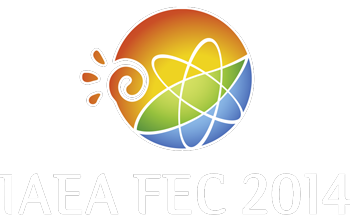Speaker
Mr
Alexey Razdobarin
(Ioffe Physical-Technical Institute of the Russian Academy of Sciences)
Description
Plasma cleaning is considered as a most promising method for in-situ recovery the surface of diagnostic mirrors installed inside ITER vacuum chamber. The engineering and physical aspects of plasma cleaning technique, being developed for Thomson scattering system in the divertor, is presented with the focus on general issues common for all optical diagnostics in ITER.
The parameters of capacitively coupled RF discharge, designed for optical surface recovery in the divertor region, are measured as a function of applied power frequency in the range 80-400 MHz. To fix the ion maximal energy in the desirable range under fast variation of neutral gas pressure in ITER the remote control of the discharge is to be provided by the RF power variation. The deuterium ion energy depending on RF power and pressure were measured for 81.3 MHz power frequency. The experimental results on magnetic field influence on ion flux parameters are also discussed.
To estimate the efficiency of the suggested system the experiments of aluminum (as Be-proxy) film removal were performed in D2 and D2/O2 glow discharge. The sputtering yield of Al was found to be 0.003 for D2+ ions with mean energy ~80 eV. It was shown that addition of 2% of oxygen increases sputtering rate by 4 times. The impact of metal deposits on the performance of diagnostic mirrors is discussed. It was shown that metallic film with a thickness as low as few nm may cause significant degradation of the diagnostic mirrors with transparent oxide coating.
| Country or International Organisation | Russian Federation |
|---|---|
| Paper Number | MPT/P4-8 |
Author
Mr
Alexey Razdobarin
(Ioffe Physical-Technical Institute of the Russian Academy of Sciences)
Co-authors
Dr
Aleksander Gorodetsky
(Frumkin Institute of Physical Chemistry and Electrochemistry)
Mr
Alexander Koval
(Ioffe Physical-Technical Institute)
Mr
Andrei Litvinov
(Ioffe Physical-Technical Institute)
Dr
Andrei Markin
(Frumkin Institute of Physical Chemistry and Electrochemistry)
Dr
Andrei Zakharov
(Frumkin Institute of Physical Chemistry and Electrochemistry)
Mr
Dmitrii Samsonov
(Ioffe Physical-Technical Institute)
Dr
Eugene Mukhin
(Ioffe Physical Technical Institute)
Dr
Frank Leipold
(ITER Organization)
Dr
Gleb Kurskiev
(Ioffe Physical-Technical Institute)
Dr
Igor Miroshnikov
(Saint-Petersburg State Polytechnic University)
Mr
Ivan Bukreev
(Ioffe Physical-Technical Institute)
Dr
Michael Walsh
(ITER Organization)
Dr
Mikhail Kochergin
(Ioffe Physical-Technical Institute)
Mr
Paul Chernakov
(Ioffe Physical-Technical Institute)
Dr
Philip Andrew
(ITER Organization)
Dr
Rinad Zalavutdinov
(Frumkin Institute of Physical Chemistry and Electrochemistry)
Dr
Roger Reichle
(ITER Organization)
Mr
Sergei Masyukevich
(Ioffe Physical-Technical Institute)
Dr
Sergei Tolstyakov
(Ioffe Physical-Technical Institute)
Dr
Valentin Bukhovets
(Frumkin Institute of Physical Chemistry and Electrochemistry)
Dr
Vladimir Semenov
(Ioffe Physical-Technical Institute)

